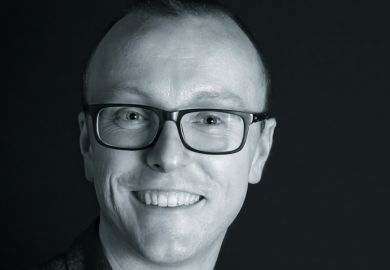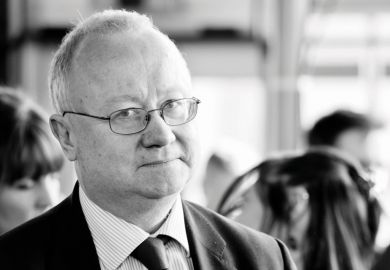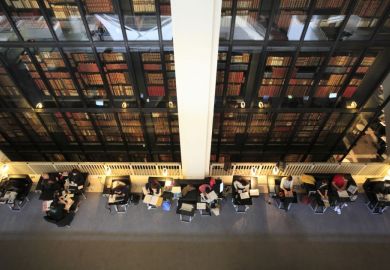Jenny Higham is principal of St George’s, University of London. A practising consultant gynaecologist, she previously held senior positions at Imperial College London. Professor Higham was instrumental in establishing the Lee Kong Chian School of Medicine in Singapore, leading Imperial’s work on the collaboration with Nanyang Technological University and serving as the school’s senior vice-dean from 2013-2015. In August, she was announced as the first female chair of the Medical Schools Council, which supports medical schools in furthering medical education and research.
Where and when were you born?
I was born in the 1960s in Warrington (then in Lancashire but now in the more glamorous sounding county of Cheshire).
How has this shaped you?
I feel I'm a Northerner, even though I've spent most of my life in the South. My parents, sisters and I moved away, but we and the rest of my large family display similar traits such as "saying it as it is", and often feeling that situations could benefit from a "good dose of common sense".
Why should Joe Bloggs care about your work?
The medical profession needs to continue to attract talented students with the right skills, behaviours and values to qualify as doctors. We also need talented staff – for inspirational education and world-class research.
With the contractual disputes between junior doctors and the UK government ongoing, do you worry for the future supply of doctors?
We have become used to attracting the brightest and best into careers in medicine and most junior doctors are not primarily motivated by money. My concern is that the current dispute may be a reflection of wider issues and I hope these do not dent future generations’ enthusiasm to study medicine.
What are the long-term effects that Brexit will have on the National Health Service workforce and the NHS in general?
The NHS, even though UK-based, is a truly international venture and our European colleagues are essential in so many roles, right across the research, health and social care delivery landscapes. We need to retain some flexibility if we are to avoid widespread vacancies, as there may be no reservoir of equally skilled individuals able to step into their shoes.
Are you also concerned with the procurement of medical academics?
Clinical service delivery is the element of medical practice with which most people identify, but the future would look bleak without education and research. It is vital that we maintain a supply of individuals interested in this area and incentivise them to make great contributions.
Medical schools educate future medical professionals, but often teaching is given a backseat in top universities in favour of research. Do you think institutions need to invest more in teaching?
Perhaps I'm overly optimistic, but I do think the education versus research debate has moved on. It can be challenging to find the right metrics, as what is valuable is not necessarily readily capable of measurement. Nonetheless, most universities and medical schools are making progress in establishing promotion prospects and career structures for those who are involved in education as well as research.
Tell us about someone you've always admired.
Rather corny I know, but I've always been grateful for the support of my husband. Not only is he the one with the massive commute, but his battles in growing a manufacturing business in a high unemployment area of Yorkshire are anything but trivial. It is a reminder to me of the relative security of both the university and NHS sectors.
What advice would you give to your younger self?
Keep going. It will work out OK.
What keeps you awake at night?
"Processing". I'm often busy from breakfast until bedtime, which doesn’t give me time to digest things. However, having spent many years as a clinician practising in a high-risk area, I try to keep some perspective: however serious the issue, it’s rarely a matter of life and death...
What's your biggest regret?
The many mistakes I've made have all taught me something, so I can't really regret them.
What advice do you give to your students?
Stick at it, qualify, get the bits of paper. For the medics, it is to remind them that medicine is a fantastic degree with hugely diverse options at the end of it. If you are not enjoying what you are doing, there are other great avenues to pursue, including outside the profession.
What kind of undergraduate were you?
Initially, one with severe imposter syndrome, having spent my latter school years more dedicated to partying than study and having needed to go to college (while working part-time in Argos) to get my physics A level.
What's your most memorable moment at university?
Nervously approaching the finals result list on the wall at University College London only to be staggered and utterly thrilled to be at the top of the year and awarded a scholarship.
Have you ever had a eureka moment?
During my research into menstrual disorders, I designed and validated a pictorial blood-loss assessment chart – a simple idea but more practical than many of the laboratory-based measurements; it is still in common use 25 years on.
If you were the higher education minister for a day, what policy would you immediately introduce to the sector?
I would work on those policies that would allow us to continue to attract the most talented staff and students to the UK's medical schools or that would allow us to immediately start training for the likely post-Brexit gaps.
Appointments
Scott Davidson has been announced as the next vice-chancellor of Newman University. Professor Davidson will join Newman in January 2017 following the retirement of Peter Lutzeier, who has led the university since 2010. Professor Davidson is currently deputy vice-chancellor at the University of Lincoln, where he is responsible for regulation and external relations including quality and academic standards, academic policy and further and higher education partnerships. “I have enjoyed my time at Lincoln and worked with some wonderful staff and students, whom I will miss dearly,” he said. “I feel both privileged and honoured to have been offered the position of vice-chancellor at Newman University and look forward to building on the superb work of Professor Lutzeier and his colleagues.”
Helen Atkinson has been appointed interim graduate dean at the University of Leicester. In her position, Professor Atkinson will play a pivotal role in establishing the new Doctoral College at the university, including appointing an academic head and professional service lead towards the end of the year. She succeeds Sarah Hainsworth, who is about to take up the post just vacated by her as head of the department of engineering. “I am very much looking forward to working right across the university to lay strong foundations for the Doctoral College,” Professor Atkinson said. She is currently chair of the education and skills panel at the Royal Academy of Engineering.
Lynn Haygarth, a lecturer and pharmacist at the University of Huddersfield, has been appointed a full fellow of the Royal Pharmaceutical Society. Ian Smith, professor of applied thermodynamics at City, University of London, has been awarded a fellowship by the Royal Academy of Engineering for his distinguished contribution to the field for more than five decades. Dennis Farrington has taken up his re-elected position as president of the university board of South East European University in Macedonia.
POSTSCRIPT:
Print headline: HE & me
Register to continue
Why register?
- Registration is free and only takes a moment
- Once registered, you can read 3 articles a month
- Sign up for our newsletter
Subscribe
Or subscribe for unlimited access to:
- Unlimited access to news, views, insights & reviews
- Digital editions
- Digital access to THE’s university and college rankings analysis
Already registered or a current subscriber?










